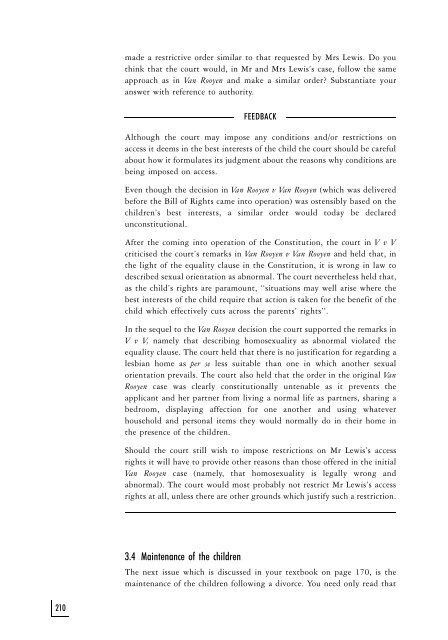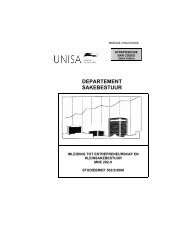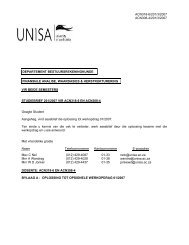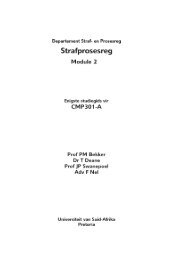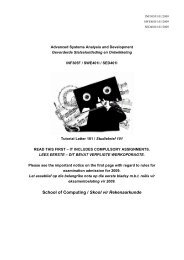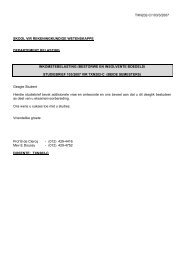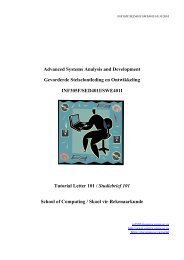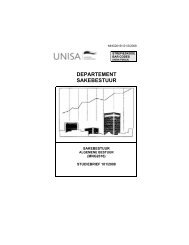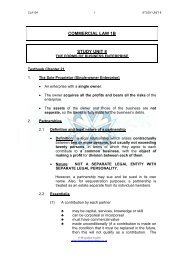key to the study guide - Name
key to the study guide - Name
key to the study guide - Name
You also want an ePaper? Increase the reach of your titles
YUMPU automatically turns print PDFs into web optimized ePapers that Google loves.
210<br />
made a restrictive order similar <strong>to</strong> that requested by Mrs Lewis. Do you<br />
think that <strong>the</strong> court would, in Mr and Mrs Lewis's case, follow <strong>the</strong> same<br />
approach as in Van Rooyen and make a similar order? Substantiate your<br />
answer with reference <strong>to</strong> authority.<br />
FEEDBACK<br />
Although <strong>the</strong> court may impose any conditions and/or restrictions on<br />
access it deems in <strong>the</strong> best interests of <strong>the</strong> child <strong>the</strong> court should be careful<br />
about how it formulates its judgment about <strong>the</strong> reasons why conditions are<br />
being imposed on access.<br />
Even though <strong>the</strong> decision in VanRooyenvVanRooyen(which was delivered<br />
before <strong>the</strong> Bill of Rights came in<strong>to</strong> operation) was ostensibly based on <strong>the</strong><br />
children's best interests, a similar order would <strong>to</strong>day be declared<br />
unconstitutional.<br />
After <strong>the</strong> coming in<strong>to</strong> operation of <strong>the</strong> Constitution, <strong>the</strong> court in VvV<br />
criticised <strong>the</strong> court's remarks in Van Rooyen v Van Rooyen and held that, in<br />
<strong>the</strong> light of <strong>the</strong> equality clause in <strong>the</strong> Constitution, it is wrong in law <strong>to</strong><br />
described sexual orientation as abnormal. The court never<strong>the</strong>less held that,<br />
as <strong>the</strong> child's rights are paramount, ``situations may well arise where <strong>the</strong><br />
best interests of <strong>the</strong> child require that action is taken for <strong>the</strong> benefit of <strong>the</strong><br />
child which effectively cuts across <strong>the</strong> parents' rights''.<br />
In <strong>the</strong> sequel <strong>to</strong> <strong>the</strong> Van Rooyen decision <strong>the</strong> court supported <strong>the</strong> remarks in<br />
V v V, namely that describing homosexuality as abnormal violated <strong>the</strong><br />
equality clause. The court held that <strong>the</strong>re is no justification for regarding a<br />
lesbian home as per se less suitable than one in which ano<strong>the</strong>r sexual<br />
orientation prevails. The court also held that <strong>the</strong> order in <strong>the</strong> original Van<br />
Rooyen case was clearly constitutionally untenable as it prevents <strong>the</strong><br />
applicant and her partner from living a normal life as partners, sharing a<br />
bedroom, displaying affection for one ano<strong>the</strong>r and using whatever<br />
household and personal items <strong>the</strong>y would normally do in <strong>the</strong>ir home in<br />
<strong>the</strong> presence of <strong>the</strong> children.<br />
Should <strong>the</strong> court still wish <strong>to</strong> impose restrictions on Mr Lewis's access<br />
rights it will have <strong>to</strong> provide o<strong>the</strong>r reasons than those offered in <strong>the</strong> initial<br />
Van Rooyen case (namely, that homosexuality is legally wrong and<br />
abnormal). The court would most probably not restrict Mr Lewis's access<br />
rights at all, unless <strong>the</strong>re are o<strong>the</strong>r grounds which justify such a restriction.<br />
3.4 Maintenance of <strong>the</strong> children<br />
The next issue which is discussed in your textbook on page 170, is <strong>the</strong><br />
maintenance of <strong>the</strong> children following a divorce. You need only read that


